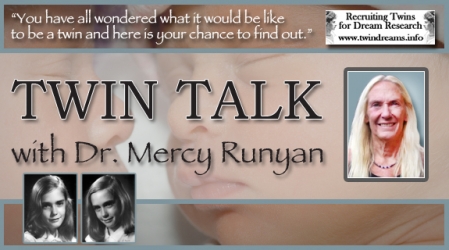
Dr. Mercy interviews experts in the field of twins, twins themselves, other multiples, families of multiples, and experts in twin studies and families from all over the country. Search your favorite topics or simply start from the beginning. These recordings are educational to those interested in all things twin related. There are 70 episodes to choose from and discounts available for multiple purchases. Enjoy!
-
 NOMOTC, founded in 1960, is currently a network of over 450 local clubs and 25000 individual parents of multiples. This non-profit organization funded by grants, donations and dues is dedicated to supporting families through education, research and networking. The organization partners with local support groups, health care providers, researchers and educators to raise public awareness about the unique qualities of multiples. NOMOTC publishes current research, expert columns, book reviews, club news, and multiple birth related articles and participates in medical and psychological research projects that involve multiples and/or their families. It is a national charter member of the International Society of Twin Studies and the COMBO. They operate a Support Service Program to assist individuals in special cases including Pen Pals for parents of disabled multiples, support for Higher Order Multiples and Bereavement Support for those who have lost a child or spouse.
NOMOTC, founded in 1960, is currently a network of over 450 local clubs and 25000 individual parents of multiples. This non-profit organization funded by grants, donations and dues is dedicated to supporting families through education, research and networking. The organization partners with local support groups, health care providers, researchers and educators to raise public awareness about the unique qualities of multiples. NOMOTC publishes current research, expert columns, book reviews, club news, and multiple birth related articles and participates in medical and psychological research projects that involve multiples and/or their families. It is a national charter member of the International Society of Twin Studies and the COMBO. They operate a Support Service Program to assist individuals in special cases including Pen Pals for parents of disabled multiples, support for Higher Order Multiples and Bereavement Support for those who have lost a child or spouse. -
 If you are a twin, a parent of twins, or close to a twin, you will enjoy the interview with Dr. Barbara Klein, a twin herself and expert in childhood development. Dr. Klein will discuss the strong influences of parenting styles and early childhood experiences on the way in which co-twins relate to each other. These methods of twinning are covered in her book ‘Not All Twins Are Alike.’ She will also answer questions such as; ‘What is it like growing up as a twin? Do twins have difficulty in non-twin relationships? Why do twins fight? Why is twin loss so profoundly difficult for the surviving twin? Why should parents stress the individual differences between their twin children? How can we help gifted and challenged twins? What are the advantages of co-twins being different?’ Dr. Klein’s twin Marjorie teaches rhetorical writing at Stanford University and Dr. Klein will surely comment on their relationship throughout the life stages of childhood and adulthood.
If you are a twin, a parent of twins, or close to a twin, you will enjoy the interview with Dr. Barbara Klein, a twin herself and expert in childhood development. Dr. Klein will discuss the strong influences of parenting styles and early childhood experiences on the way in which co-twins relate to each other. These methods of twinning are covered in her book ‘Not All Twins Are Alike.’ She will also answer questions such as; ‘What is it like growing up as a twin? Do twins have difficulty in non-twin relationships? Why do twins fight? Why is twin loss so profoundly difficult for the surviving twin? Why should parents stress the individual differences between their twin children? How can we help gifted and challenged twins? What are the advantages of co-twins being different?’ Dr. Klein’s twin Marjorie teaches rhetorical writing at Stanford University and Dr. Klein will surely comment on their relationship throughout the life stages of childhood and adulthood. -
 In this program, Dr. Mercy will discuss studies performed with identical and fraternal twins as participants. If you have been a participant in a twin study perhaps through one of the large registries that exist through the United States and the world, we would love to hear your experiences. Twin studies can be cross-sectional or longitudinal; they often focus on the interrelationship among genetics, shared environment, and non-shared environment in order to determine the relative effects on personality, aptitudes, life experiences, and health. Some studies have been done with MRI technology to measure the size of fetal brains. Dr. Mercy will cover these resources and will also discuss the recent findings that identical twin DNA is not necessarily identical; she welcomes callers to discuss the implications of such results for society and the twins themselves. She will also report on various twin registries across the world, their purposes, and some results of the longitudinal studies that these registries are used to conduct.
In this program, Dr. Mercy will discuss studies performed with identical and fraternal twins as participants. If you have been a participant in a twin study perhaps through one of the large registries that exist through the United States and the world, we would love to hear your experiences. Twin studies can be cross-sectional or longitudinal; they often focus on the interrelationship among genetics, shared environment, and non-shared environment in order to determine the relative effects on personality, aptitudes, life experiences, and health. Some studies have been done with MRI technology to measure the size of fetal brains. Dr. Mercy will cover these resources and will also discuss the recent findings that identical twin DNA is not necessarily identical; she welcomes callers to discuss the implications of such results for society and the twins themselves. She will also report on various twin registries across the world, their purposes, and some results of the longitudinal studies that these registries are used to conduct.

